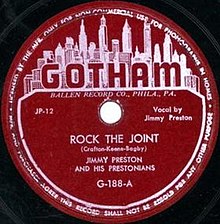Rock the Joint
| "Rock The Joint" | |
|---|---|
 |
|
| Single by Jimmy Preston & His Prestonians | |
| B-side | "Drinking Woman" |
| Released | 1949 |
| Genre | Rhythm and Blues, rock and roll |
| Length | 2:37 |
| Label | Gotham |
| Songwriter(s) | Harold Crafton, Wendell Keane, Harold Bagby |
"Rock the Joint", also known as "We're Gonna Rock This Joint Tonight", is a boogie song recorded by various proto-rock and roll singers, notably Jimmy Preston and early rock and roll singers, most notably Bill Haley. Preston's version has been cited as a contender for being "the first rock and roll record", and Haley's is widely considered the first rockabilly record.
The song's authorship is credited to Harry Crafton, Wendell "Don" Keane, and Harry "Doc" Bagby, who were musicians contracted to the Gotham label in New York, owned by Ivin Ballen (although a live version recorded by Haley in 1969 for Buddah Records was credited to James Bracken). The song was influenced by earlier R&B recordings such as Wynonie Harris' 1948 R&B hit "Good Rockin' Tonight". Ballen passed the song to Jimmy Preston, who had recently had a hit with "Hucklebuck Daddy". The version by Jimmy Preston and His Prestonians was recorded in Philadelphia in May 1949 and was released on the Gotham label, reaching #6 on the national R&B chart later that year.
Two years later, Bill Haley and the Saddlemen had already achieved some success with their cover of Ike Turner's (and/or Jackie Brenston's) "Rocket 88", but were looking for another hit. They were persuaded by their producer, Essex Records owner Dave Miller, to cover "Rock The Joint" - a song which, like "Rocket 88", had already been successful with R&B audiences. Haley recorded the song (the exact location is unknown but is believed to have been recorded in the band's hometown of Chester, Pennsylvania [1]) in February or March 1952, but made up verses of his own to appeal to his country audience, named a succession of hillbilly dances (such as the Sugarfoot Rag and Virginia Reel) in place of Preston's hucklebuck and jitterbug, and also used different instrumentation on the track, and more back echo. In particular, Haley's version used a prominent percussive slapped bass played by Marshall Lytle [2] and electric guitar by Danny Cedrone, with a lick he duplicated two years later on "Rock Around The Clock".
...
Wikipedia
